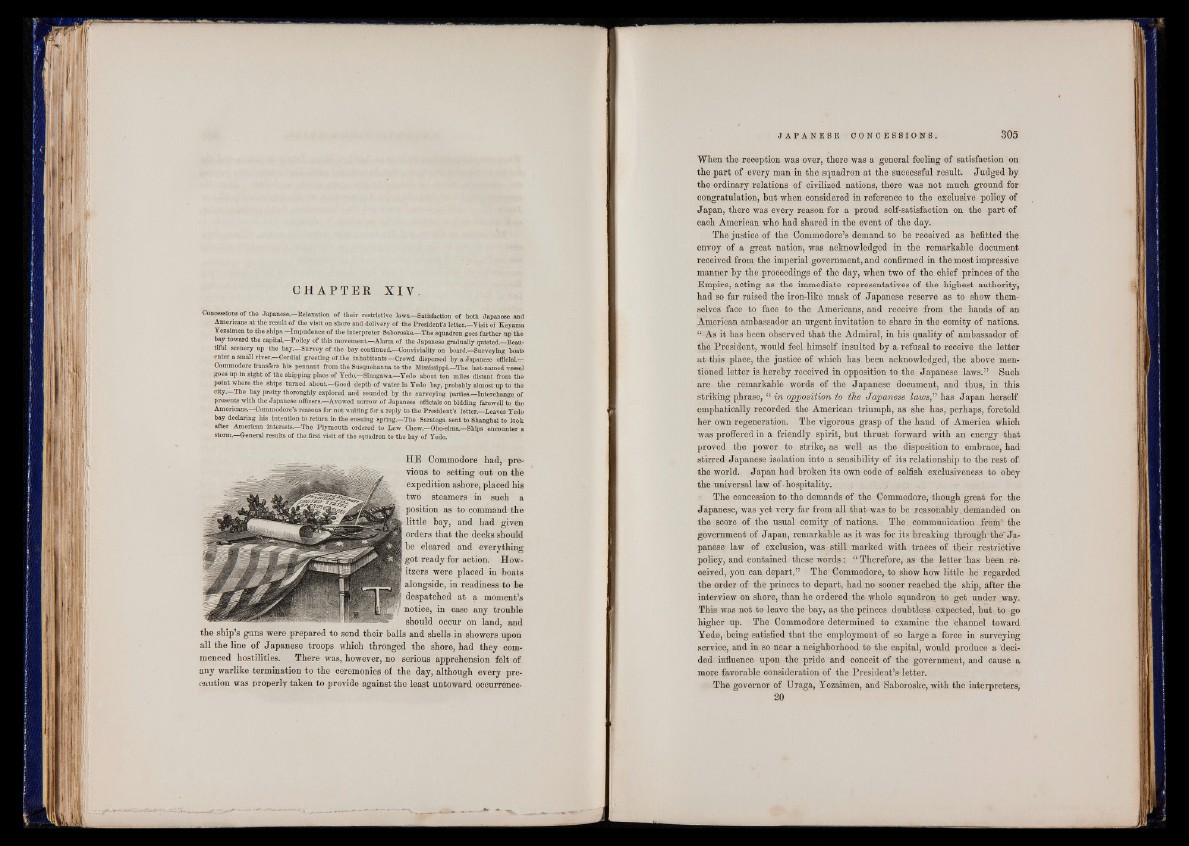
CHAPTER XIV.
Concessions of the Japanese.—Relaxation of their restrictive laws.—Satisfaction of both Japanese and
Americans at the result of the visit on shore and delivery of the President’s letter.—Yisit of Keyama
Yezaimen to the ships.—Impudence of the interpreter Saboroske.—The squadron goes further up the
bay toward the capital.—Policy o f this m ovement—Alarm of the Japanese gradually quieted.—Beautiful
scenery up the bay.—Survey o f the bay continued.—Conviviality on board.—Surveying boats
enter a small river.—Cordial greeting o f the inhabitants —Crowd dispersed by a Japanese official.—
Commodore transfers his pennant from the Susquehanna to the Mississippi.—The last-named vessel
goes up in sight of the shipping place of Yedo.—Sinagawa.—Yedo about ten miles distant from the
point where the ships turned about.—Good depth of water in Yedo bay, probably almost up to the
The bay pretty thoroughly explored and sounded by the surveying parties.—Interchange of
presents with the Japanese officers.—Avowed sorrow of Japanese officials on bidding farewell to the
Americans.—Commodore’s reasons for not waiting for a reply to the President’s letter.—Leaves Yedo
bay declaring his intention to return in the ensuing spring—The Saratoga sent to Shanghai to look
after American interests.—The Plymouth ordered to Lew Chew.—Oho-sima.—Ships encounter a
storm.—General results of the first visit of the squadron to the bay of Yedo.
■
■ n
HE Commodore had, previous
to setting out on the
expedition ashore, placed his
two steamers in such a
position as to command the
• little bay, and had given
orders that the decks should
be cleared and everything
got ready for action. How-
' itzers were placed in boats
| alongside, in readiness to be
1 despatched at a moment’s
notice, in case any trouble
should occur on land, and
the ship’s guns were prepared to send their balls and shells in showers upon
all the line of Japanese troops which thronged the shore, had they commenced
hostilities. There was, however, no serious apprehension felt of
any warlike termination to the ceremonies of the day, although every precaution
was properly taken to provide against the least untoward occurrence-
I
When the reception was over, there was a general feeling of satisfaction on
the part of every man in the squadron at the successful result. Judged by
the ordinary relations of civilized nations, there was not much ground for
congratulation, but when considered in reference to the exclusive policy of
Japan, there was every reason for a proud self-satisfaction on the part of
each American who had shared in the event of the day.
The justice of the Commodore’s demand to be received as befitted the
envoy of a great nation, was acknowledged in the remarkable document
received from the imperial government, and confirmed in the most impressive
manner by the proceedings of the day, when two of the chief princes of the
Empire, acting as the immediate representatives of the highest authority,
had so far raised the iron-like mask of Japanese reserve as to show themselves
face to face to the Americans, and receive from the hands of an
American ambassador an urgent invitation to share in the comity of nations.
“ As it has been observed that the Admiral, in his quality of ambassador of
the President, would feel himself insulted by a refusal to receive the letter
at this place, the justice of which has been acknowledged, the above mentioned
letter is hereby received in opposition to the. Japanese laws.” Such
are the remarkable words of the Japanese document, and thus, in this
striking phrase, “ in opposition to the Japanese laws,” has Japan herself
emphatically recorded the American triumph, as she has, perhaps, foretold
her own regeneration. The vigorous grasp of the hand of America which
was proffered in a friendly spirit, but thrust forward with an energy that
proved the power to strike, as well as the disposition to embrace, had
stirred Japanese isolation into a sensibility of its relationship to the rest of
the world. Japan had broken its own code of selfish exclusiveness to obey
the universal law of -hospitality.
The concession to the demands of the Commodore, though great for the
Japanese, was yet very far from all that was to be reasonably.demanded on
the score of the usual comity of nations. . The, communication Jrofn' the
government of Japan, remarkable as it was for its breaking through-the" Ja panese
law of exclusion, was - still marked with traces of their restrictive
policy, and contained these words,. “ Therefore, as -the letter has been received,
you can depart.” The’Commodore, to show how little he regarded
the order of the princes to depart, had no sooner reached the ship, after the
interview on shore, than he ordered the whole squadron to get under way.
This was not to leave the bay, as the princes doubtless; expected, but to go
higher up. The Commodore determined to examine the channel toward
Yedo, being satisfied that the employment of so large a force in surveying
service, and in so near a neighborhood to the capital, would produce a decided
influence upon the pride and conceit of the government, and cause a
more favorable consideration of the President’s letter.
The governor of Uraga, Yezaimen, and Saboroske, with the interpreters,
20